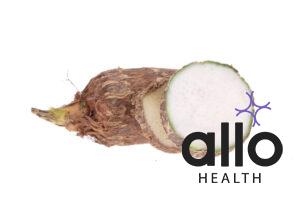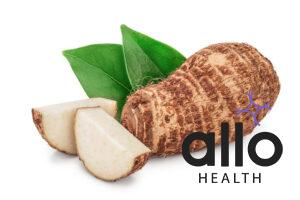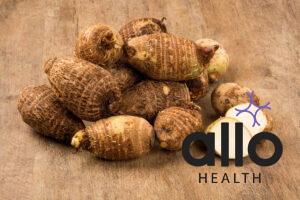The Benefits of Eating Arbi During Pregnancy

Allo Health is dedicated to personalized well-being, offering support and trusted information tailored to individual health goals. The platform emphasizes human-generated content, led by a distinguished medical team of experts, including physicians and sexual health specialists. Their commitment to credibility involves rigorous fact-checking, authoritative research, and continuous updates to ensure accurate, up-to-date information. Allo Health's unique approach goes beyond conventional platforms, providing expert-led insights and a continuous commitment to excellence, with user feedback playing a crucial role in shaping the platform's authoritative voice.

Dr Sanina Mansoor holds MBBS degree from Yenepoya university,Mangalore.She has 8 years of experience working as a medical officer at various health centres and medical colleges.
Why This Was Upated?
Our experts continually monitor the health and wellness space, and we update our articles when new information became available.
Updated on 15 April, 2024
- Article was updated as part of our commitment to diversity, equity, and inclusion.

"The following blog article discusses food and diet-related information for general educational purposes. However, it is important to note that the information provided is not intended as personalized dietary advice and should not be considered a substitute for professional guidance from a registered dietitian or qualified healthcare professional. Before making any significant changes to your diet or nutrition plan, it is recommended to consult with a registered dietitian or healthcare professional.
Book consultation
Dietary changes can have a significant impact on your overall health and well-being. It is important to approach any changes to your diet in a balanced and sustainable manner, ensuring that you meet your nutritional needs and avoid any potential nutrient deficiencies. Rapid or extreme changes in dietary patterns can be detrimental to your health and may require professional guidance.
It is crucial to note that any specific dietary recommendations or guidelines mentioned in this article may not be appropriate for individuals with specific medical conditions, allergies, or intolerances. A registered dietitian or healthcare professional can provide individualized advice, including modifications or alternative food choices to accommodate your unique circumstances.
The information provided in this article may not encompass all possible dietary considerations or account for the latest research and nutritional guidelines."
Pregnancy is a time when a woman’s body undergoes significant changes. A proper and balanced diet is crucial for the health of both the mother and the baby. One such nutrient-rich food that can be beneficial during pregnancy is arbi. Arbi, also known as taro root, is a tuber vegetable with a unique taste. In this article, we will explore the benefits of eating arbi in pregnancy.
What is Arbi?

Arbi, also known as Colocasia or Taro Root, is a starchy and nutritious root vegetable commonly found in various cuisines.
It is a great source of nutrients for pregnant women. It is rich in fiber, potassium, and vitamins C and E. These nutrients are essential for the healthy development of the fetus and can also help prevent constipation and other digestive issues during pregnancy.
It is a versatile ingredient that can be boiled, roasted, fried, or mashed, making it easy to incorporate into your diet during pregnancy.
Arbi is an excellent source of essential vitamins and minerals for a healthy pregnancy. It is rich in dietary fiber, potassium, iron, folic acid and magnesium.
These beneficial nutrients help maintain healthy blood pressure levels, boost digestion, reduce the risk of anemia, and promote healthy bowel movements.
Additionally, arbi has a low glycemic index, which means it can help regulate blood sugar levels and prevent gestational diabetes.
Nutrition Value of Arbi for Pregnant Women
The nutritional value of arbi are:
- Arbi is a nutrient-dense food rich in essential vitamins and minerals, making it beneficial during pregnancy.
- A 100g serving of arbi contains approximately 112 calories, 2.3g protein, 26g carbohydrates, 4.1g fiber, and 0.2g fat.
- It is a good source of potassium, providing around 15% of the daily requirement in a 100g serving.
- Arbi’s phytochemicals act as antioxidants, protecting cells and tissues from oxidative damage.
- Complex carbohydrates in arbi offer sustained energy levels and may lower the risk of gestational diabetes.
- Arbi is believed to have anti-inflammatory and anti-cancer properties due to compounds like flavonoids and polyphenols.
- It can help regulate blood sugar levels and improve digestion, making it a valuable addition to the diet of pregnant women.
- 100g serving offers 5% of daily recommended intake of iron, vital for hemoglobin production.
- Fiber aids in maintaining digestive health, averting constipation during pregnancy.
- With low calorie and fat content, arbi is suitable for maintaining a healthy weight during pregnancy.
- A 100g serving provides 16% of daily recommended intake of vitamin C, aiding collagen formation and boosting immunity.
- Vitamin B6 in arbi is vital for fetal brain and nervous system development, promoting healthy growth.
- Arbi can be boiled, roasted, or fried, fitting into various dishes like curries, stews, and salads.
Is Consuming Arbi Safe During Pregnancy?
Yes, consuming arbi in moderate amounts is generally considered safe during pregnancy. Arbi should be cooked thoroughly before consumption to avoid any potential health risks. Raw or undercooked arbi can contain harmful toxins that can cause gastrointestinal issues.
Benefits of Eating Arbi During Pregnancy

Arbi has numerous benefits for pregnant women. It’s essential nutrients and potassium content helps regulate blood pressure levels and reduce the risk of gestational hypertension.
1. Regulates Digestive System
During pregnancy, hormonal changes can sometimes lead to digestive discomfort, including bloating and constipation. Arbi comes to the rescue with its high dietary fiber content.
A 100g serving of arbi provides around 9% of your daily recommended fiber intake. The dietary fibre in arbi helps maintain healthy bowel movements, reducing the risk of constipation.
2. Good Source of Iron
Iron is an essential nutrient during pregnancy as it contributes to the production of hemoglobin.
Arbi steps in as a reliable source of iron, providing approximately 5% of your daily recommended intake in a 100g serving. By including arbi in your diet, you’re helping to ensure a healthy oxygen supply to both you and your developing baby.
3. Low in Calories, Ideal for Weight Management
Maintaining a healthy weight during pregnancy is crucial for your well-being and your baby’s health. Arbi comes to your aid with its low-calorie content, making it a suitable choice for those conscious of their weight
4. Boosts Immune System with Vitamin C
Vitamin C is renowned for its immune-boosting properties, and arbi happens to be a source of this essential nutrient. A 100g serving of arbi offers approximately 16% of your daily recommended intake of vitamin C. This powerful antioxidant can help protect your cells from damage and support your immune system, which is especially important during pregnancy when your body’s demands are higher.
5. Builds Strong Bones and Teeth
Calcium and phosphorus are vital minerals for building strong bones and teeth, both for you and your baby. Arbi contributes to this aspect of your pregnancy nutrition as it contains these essential minerals.
6. Sustained Energy with Complex Carbohydrates
The complex carbohydrates in arbi help in maintaining sustained energy levels throughout the day. This can be particularly beneficial during the third trimester when a woman tends to feel more tired and fatigued.
7. Folate Support for Fetal Development
Arbi is also a good source of folate, which is essential for the proper development of the fetal neural tube. The potassium in arbi helps properly form the fetal muscles and tissues.
Adequate intake of folate during pregnancy can help prevent birth defects such as spina bifida. Therefore, including arbi in pregnant women’s diet can positively impact the health and development of the fetus.
8. Arbi in Diabetes During Pregnancy
Arbi provides dietary fiber, which can help stabilize blood sugar levels and promote better digestion. The fiber content in arbi slows down the absorption of glucose, potentially leading to more controlled blood sugar responses.
9. Fluid Balance & Swelling Prevention
The potassium in arbi helps maintain proper fluid balance, reducing the risk of swelling and edema during pregnancy.
Arbi: The Perfect Addition to Your Prenatal Diet
Incorporating arbi in your pregnancy diet is easy and delicious. Arbi can be boiled, roasted, mashed, or fried and used in a variety of dishes. It can be added to soups, stews, curries, or used as a substitute for potatoes. Here are some easy and delicious recipes to try:
- Arbi Masala
- Arbi Ki Tikki
- Arbi Fry
- Arbi Biryani
- Arbi Kadhi
How to Choose the Best Arbi

Arbi, widely available in various markets, should be chosen based on its firmness, weight, and lack of blemishes or discoloration, while avoiding soft or mushy ones which could indicate spoilage. Proper storage entails keeping arbi in a cool, dry place, away from direct sunlight, preserving its quality for about a week.
Eating Arbi in Pregnancy: Dos and Don’ts
While arbi can be highly beneficial during pregnancy, keeping certain dos and don’ts in mind is essential. Here are some pointers:
- Do wash and clean the arbi thoroughly before cooking.
- Do not consume raw arbi as it contains calcium oxalate crystals which can cause irritation in the throat and tongue.
- Do not consume arbi in excess as it may cause bloating and flatulence.
- Consult a doctor before consuming arbi if you have a history of kidney stones.
However, it is important to note that arbi should be consumed in moderation during pregnancy. Excessive consumption of arbi can lead to a spike in blood sugar levels, which can be harmful to both the mother and the baby. It is recommended that pregnant women consume no more than one serving of arbi per day.
Conclusion:
Arbi is a nutrient-dense superfood that can be highly beneficial during pregnancy. The vitamins, minerals, and antioxidants present in arbi help in maintaining a healthy pregnancy and promoting fetal development. Incorporating arbi in your pregnancy diet can help alleviate common pregnancy symptoms and reduce the risk of complications.
It is important to note that while arbi is a healthy addition to a pregnancy diet, it should be consumed in moderation. Eating too much arbi can lead to digestive issues and discomfort. It is recommended to consult with a healthcare provider or a registered dietitian to determine the appropriate amount of arbi to include in your diet. Additionally, it is important to ensure that the arbi is cooked thoroughly before consumption to avoid any potential foodborne illnesses.
Frequently Asked Questions:
Q. Can I eat arbi during pregnancy?
A. Yes, consuming arbi (taro root) in moderation is generally safe during pregnancy. It provides valuable nutrients and dietary fiber. Consult your healthcare provider for personalized advice.
Q. Is arbi good for gestational diabetes?
A. Arbi can be part of a diabetes-friendly diet due to its fiber content and low glycemic index. Monitor portions, pair with protein, and consult a healthcare provider for suitable incorporation.
Q. How should I prepare arbi during pregnancy?
A. You can prepare arbi by boiling or steaming to manage blood sugar levels. Portion control and balanced meals are important. Remember, individual dietary needs vary, so discussing arbi consumption with your healthcare provider ensures that it aligns with your pregnancy health goals.






































